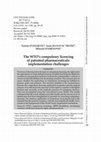Papers by Milorad Stamenovic

The Second International Scientific Conference ”Challenges of Digitalization in the Business World”Belgrade, November 23th 2023, Alfa BK University, ISBN 978-86-6461-068-1 p.p. 243-256.At: Belgrade, 2023
Thanks to the fast lifestyle, the rapid improvement of financial technology, and the inevitable c... more Thanks to the fast lifestyle, the rapid improvement of financial technology, and the inevitable connection of the financial sector with virtual transactions and the increase of opportunities for cybercriminals, led to the introduction of artificial intelligence, in order to find a way to improve protection mechanisms in the fight against money laundering. The previous AML approach has been upgraded to a new risk-based approach. In the paper, the authors explore the importance of artificial intelligence in the fight against money laundering. A new risk-based approach to AML that uses artificial intelligence can reduce costs in retail banking, insurance services, and correspondent banking. In order to investigate the importance of artificial intelligence in the fight against money laundering, the paper used authorized data from national and international financial organizations that deal with the fight against money laundering. The time series used in the paper include data related to the period from 2016 to 2022. All data used in the work from 2018 to 2022 were processed on an annual basis. Key words: Artificial Intelligence, Money Laundering, New risk-based approach to AML, Risks. This paper is part of the results of research on project U 01/2023 Green economy in the era of digitization, Faculty of Finance, Banking and Auditing, Alpha BK University in Belgrade.

The Second International Scientific Conference ”Challenges of Digitalization in the Business World”Belgrade, November 23th 2023, Alfa BK University, ISBN 978-86-6461-068-1, p.p. 84-99At: Belgrade, 2023
The clinical trials industry plays a vital role in developing and evaluating new medical treatmen... more The clinical trials industry plays a vital role in developing and evaluating new medical treatments, therapies, and interventions. High costs, lengthy processes, and strict regulatory requirements contribute to the burdensome nature of conducting clinical trials. Patient recruitment and retention difficulties and data quality and integrity issues further complicate the process. The COVID-19 pandemic has highlighted the need for alternative approaches, such as decentralized and remote participation, to overcome traditional barriers in clinical trials. Additionally, using artificial intelligence and machine learning (AI/ML) in drug development presents opportunities to enhance the availability of safe and effective drugs, improve health equity, and enable personalized treatments. Regulatory complexities and the importance of maintaining data reliability and security must be considered when implementing AI/ML solutions. This paper provides an overview of the current settings and challenges of the clinical trials industry based on the latest Food and Drug Agency (FDA) guidance, highlighting the need for innovative solutions and a shift towards decentralized and patient-centric approaches in clinical trial design and execution. Paper concludes by emphasizing the potential benefits of AI/ML in drug development and the importance of regulatory compliance and data management through decentralization. Keywords: clinical trials, decentralized trials, patient recruitment and retention, data integrity, artificial intelligence, regulatory compliance, digital health technologies.
Revizor, 2023
Health cooperatives were initiated in Serbia in the late 19th century, while a fully developed mo... more Health cooperatives were initiated in Serbia in the late 19th century, while a fully developed model of modern health cooper atives was in 1921, providing a model for other countries. Today, there are currently very few health cooperatives in Serbia. An initiative was submitted in 2020 to promote their re-establishment and recommend that the government consider public-cooperative partnership forms to enhance healthcare accessibility and quality. Health coop eratives could address challenges in organizing preventive activities, health education, services not covered by health insurance or expensive in private practice, rural health development, reduction of emigration of health personnel, profiling and complication of health services, and development of medical research, among other sectors.

Međunarodna politika 75(1190):39-55, 2024
The focus of the research is the topic of compulsory licensing, the right under the Agreement on ... more The focus of the research is the topic of compulsory licensing, the right under the Agreement on Trade-Related Aspects of Intellectual Property Rights, for countries to use patented medicines without the patent holder’s consent as a form of relief (flexibilities) for developing countries. The research aims to assess whether the application of compulsory licencing has fulfilled its primary goals and purpose. The research problem is the in consistency between the compulsory licencing application in practice and the original purpose. It is reflected in the mass use of this right by countries with higher incomes and, secondly, in the symbolic presence of contagious diseases. That was investigated using the Generalized Linear Model. The results confirmed that the actual situation of public health and the income level of beneficiaries had been marginalised as grounds for exercising compulsory licencing. The arbitrary application of compulsory licencing has led to the situation that the poorest countries, with the most significant health crises, remain in the background of this World Trade Organisation mechanism.

This monograph was created at the time of the centenary of the formation of the first health coop... more This monograph was created at the time of the centenary of the formation of the first health cooperatives on the territory of Serbia. Its goal is to show the essential elements in the life, work, and activities of the pioneer of health cooperatives in Serbia – Dr Gavrilo Kojić, and to remind us of his significant ideas, their development path and their embodiment in practice. In addition, inspired by the international success of the health-cooperative model originating from Serbia (developed in the Kingdom of SHS and the Kingdom of Yugoslavia but closed down in the Federal Republic of Yugoslavia), we believe that this study has broader social significance and that thanks to its results in further research we can map with considerable certainty the influence of the conceptual and physical development of health cooperatives in the world, guided by the initial ideas of pioneers from Serbia. Dr Kojić is not the only pioneer of health cooperatives in Serbia, and whether he is the most deserving can be further debated. However, he is undoubtedly one of the leading figures in developing this noble idea. In ad- dition, Dr Kojić devoted his, unfortunately, short but experience-rich life to a large extent to the development of health cooperatives, guided above all by the needs and desire to provide adequate health care to the population in rural areas. Whether and how much his work was influenced by the so-called utopian works of Plato, Francis Bacon, Etienne Cabe, or Thomas More remains to be determined. However, the influence of these authors is noticeable in his work, whose works had a significant impact on the development of the cooperatives organisations. We can and should undoubtedly classify Dr Kojić as one of the ideologues of cooperatives, reformers of the cooperative organizational form and innovators in the field of world of cooperatives, at the highest level, as worthy follower of Robert Owen, Charles Fourier, Frederik Wilhelm Raiffeisen and others. As part of this monograph, rare documents from the archives of the Museum of Science and Technology were published for the first time.

In book: International Organizations and States’ Response to COVID-19, 2021
This paper deals with compulsory licensing for pharmaceuticals based on the TRIPS Agreement durin... more This paper deals with compulsory licensing for pharmaceuticals based on the TRIPS Agreement during the COVID-19 pandemic. Considering that the vaccines are under patent protection, and a pandemic is in effect, questions are arising about the timely delivery of the new vaccines on a global level at the time of a global health crisis. In this research, we provide an additional view on the question of the approach of the selected countries to compulsory licensing in the time of the COVID-19 pandemic. We examined multiple cases of countries and their approach to compulsory licensing during the pandemic, and we assessed examples of compulsory licensing in the past regarding antiretroviral therapy. We are also interested in understanding countries’ profiles considering the pandemic through factors that have potentially triggered decisions in preparation for compulsory licensing or in initiating such a request. To address this question, we use inductive and deductive methods in the analysis and synthesis of the observed literature, including a statistical showcase of the data. The results put additional light on the selected factors impacting countries’ decisions for compulsory licensing and the approaches of the observed countries/cases to the compulsory licensing considering national legislation and pandemic effects on the observed country.

Međunarodna politika, 2024
The focus of the research is the topic of compulsory licencing, the right under the Agreement on ... more The focus of the research is the topic of compulsory licencing, the right under the Agreement on Trade-Related Aspects of Intellectual Property Rights for countries to use patented medicines without the patent holder's consent as a form of relief (flexibilities) for developing countries. The research aims to assess whether the application of compulsory licencing has fulfilled its primary goals and purpose. The research problem is the inconsistency between the compulsory licencing application in practice and the original purpose. It is reflected in the mass use of this right by countries with higher incomes and, secondly, in the symbolic presence of contagious diseases. That was investigated using the Generalized Linear Model. The results confirmed that the actual situation of public health and the income level of beneficiaries had been marginalised as grounds for exercising compulsory licencing. The arbitrary application of compulsory licencing has led to the situation that the poorest countries, with the most significant health crises, remain in the background of this World Trade Organisation mechanism.
Revizor, Dec 31, 2023
Health cooperatives were initiated in Serbia in the late 19 th century, while a fully developed m... more Health cooperatives were initiated in Serbia in the late 19 th century, while a fully developed model of modern health cooperatives was in 1921, providing a model for other countries. Today, there are currently very few health cooperatives in Serbia. An initiative was submitted in 2020 to promote their re-establishment and recommend that the government consider public-cooperative partnership forms to enhance healthcare accessibility and quality. Health cooperatives could address challenges in organizing preventive activities, health education, services not covered by health insurance or expensive in private practice, rural health development, reduction of emigration of health personnel, profiling and complication of health services, and development of medical research, among other sectors.
Routledge eBooks, Oct 23, 2023

Routledge Books, Oct 23, 2023
In the era of complex healthcare challenges, the question arises: Can health cooperatives be the ... more In the era of complex healthcare challenges, the question arises: Can health cooperatives be the catalysts for transformation in the healthcare system? This research monograph delves into this thought-provoking query, exploring the potential of health cooperatives as influential entities in the future of healthcare. Despite advancements, healthcare systems still need help with sustainability, equality, costly therapies and various other segments. This monograph aims to dissect the notion of "Healthy lives and well-being for everyone," protracted by policymakers and proponents of the existing healthcare setup. Researchers, cooperative professionals, healthcare practitioners, decision-makers, patients, policy developers, librarians and booksellers will find this book relevant and interesting to read. The captivating narrative is supported by analysing 20 countries across five continents, explaining their historical and modern notion of the context and health cooperatives' development. It also sheds light on the significance of modern cooperatives in the current healthcare landscape. In addition, the monograph offers insights into multiple case studies of health-oriented cooperatives showing their diversity and flexibility in operations.
Routledge eBooks, Oct 23, 2023
Routledge eBooks, Oct 23, 2023
Routledge eBooks, Oct 23, 2023
Routledge eBooks, Oct 23, 2023
Routledge eBooks, Oct 23, 2023

This paper presents some of the most significant issues of the healthcate system of the Republic ... more This paper presents some of the most significant issues of the healthcate system of the Republic of Serbia that can significantly influence sustainability in the future. The economic sustainability of healthcare systems is presented in the literature as an increasingly important component that needs to be predicted in the short and long term in line with the development capacities of the healthcare system. The paper presents the financial aspects of the system (as an aspect of the share in GDP), as well as the presentation of the financial performance of healthcare institutions. In addition, the emigration of medical personnel and the average age of doctors are taken into account as one of the examples of insufficiently effective labor force optimization. The equipment of healthcare institutions and the obsolescence of equipment are another element that deserves attention. The socioeconomic factors of the Serbian population are shown in order to determine the overall quality of life in line with modern health definitions. It was concluded that the entire healthcare system needs to be optimized, including, among other things, more efficient planning, retrospective analysis and resource optimization. Corruption is also a segment of importance to be systematically worked out. Method: The paper primarily analyzes and synthesizes literature as well as previous author's research in the field of health economics. Results: The results of the analysis indicate the importance of selected problems of the health care system of the Republic of Serbia in the context of sustainability. These results highlight the need for comprehensive health care reform that would be based on the formulation of a National Strategy.
Razvoj ideje o liberalizmu vodio je od politicke misli ka danasnjem neoliberalnom ekonomskom obli... more Razvoj ideje o liberalizmu vodio je od politicke misli ka danasnjem neoliberalnom ekonomskom obliku i vodecoj svetskoj ideologiji. Veza između globalizacije, liberalizacije tržista, razvoja trgovinskih odnosa, uticaja međunarodnih organizacija i neoliberalizma isprepletena je u u ovom radu prikazana delimicno hronoloski, a delimicno kroz analizu tržisnih kretanja i događaja od znacaja. U cilјu liberalizacije tržista važno je redefinisati ulogu države kao „posrednika“ u svim tržisnim aktivnostima, koja posredstvom monetarne i fiskalne politike upravlјa tržisnim odnosima. Proces globalizacije, posebno one ekonomske, aktivno menja te odnose. Međutim, neki autori isticu ozbilјne nedostatke razvijenog liberalnog tržista koji su od velikog znacaja za dalјi globalni razvoj i progres tržista, a samim tim i trgovine kao procesa.
Revizor, 2021
Ma na ge rial per ception, cor po ra te su sta i na bi lity, pu blic in sti tu ti ons, agro bi o ... more Ma na ge rial per ception, cor po ra te su sta i na bi lity, pu blic in sti tu ti ons, agro bi o techno logy.
Revizor, 2020
Key words: phar ma ce u ti cal indu stry, pa tent pro tec tion, corpo ra te espi o na ge.









Uploads
Papers by Milorad Stamenovic
Health cooperatives (the model that was developed in Serbia in the 19th century) can be considered as “Serbian invention” and the first model of that kind (according to available documentation). Health cooperatives had an immense impact on society, as those cooperatives used to solve numerous healthcare, public health, educational, demographic, and other problems after the First World War (and previous Balkan wars 1912–1913). That concept was so successful that numerous delegations from the USA to India and from Poland to Japan visited Serbia to understand the concept and then to transfer it to their home countries. Historically looking, there are not so many innovative solutions (especially in the area of state policy and administration) that have been transferred from Serbia to the developed western countries, but health cooperatives were such phenomena. In order to create health cooperatives, Serbian experts worked together with politicians, administrative state bodies, professional elites, and the population itself. The model was recognized as the one that responded successfully to the problems Serbia was facing at that time (19th and early 20th century). It seems that history as science did not recognize the importance of health cooperatives in an adequate way, and its overall impact on society as well as its international contribution. This scientific monograph represents The Initiative for Opening Health Cooperatives in the Republic of Serbia (further on: The Initiative) submitted to the Parliament of the Republic of Serbia. The initiative is based on many years of active research on the topic of health cooperatives by the author. The initiative was submitted to the Parliament in order to emphasize the importance of health cooperatives today, historical aspects of cooperatives in Serbia, and to request a public hearing on this emerging topic. This initiative is the first of its kind since 1949 when health cooperatives in Serbia were abolished and included in the public health care system. Therefore, this should be considered as the second such initiative having in mind the first initiative in 1921 when there was noted spreading of health cooperatives after the First World War. This scientific monograph is created as a longitudinal study of organizational change of health cooperatives looking from the perspective of a health economist. Although it is rich with data and relevant sources, it is essential that history experts would also deal with this topic in the future using a specific methodology and historical analysis, which should additionally contribute to a better understanding of this topic. The fact is that health cooperatives were particularly important for rural areas at that time that were more affected by public health issues compared to urban areas. The literature on those topics is not largely developed, especially looking at the last few decades – which leaves considerable room for further research. New models of health cooperatives have been developed in modern societies (especially looking from the organizational and business perspective), and the model that was mainly discussed in this research (developed in Serbia in the 19th century) is still present in a similar form in India and Brazil. This research is particularly interested in the period between 1921 and 1949. Today, the Law on Cooperatives of the Republic of Serbia (2015) allows forming health cooperatives in the Republic of Serbia – but it is a question why, as there have been no health cooperatives developed since 1949. Health cooperatives formed in the 19th century and later in the territory of the Kingdom of Serbs, Croats and Slovenes (the so-called “Serbian Model of Health Cooperatives”) were definitely a turning point in the way the health system of that time functioned. Besides, it was a kind of “invention” that did not exist in this form in the world, as evidenced by numerous materials on the founding and taking over of such a model worldwide (Japan, the United States, India, Bulgaria, Poland, Romania, and other countries that initiated the creation of parts of the system or the entire cooperative healthcare system in their territories in the period between the two wars). The establishment of this form of cooperative society was facilitated by the coherence and joint initiatives of all relevant stakeholders – most notably the Ministry of Public Health, the People’s Movements and international organizations, and the American Child Welfare Association of America – which have played a vital role. This organization participated in the development of the health cooperatives from an idea to the very realization and provided both advisory and financial assistance. The difficult public health situation that emerged even before the First World War (two Balkan wars) and especially after that war, also initiated the launch of health cooperatives 1. ABOUT THE INITIATIVE – OBJECTIVES AND RELEVANCE The initiative of Dr. Milorad Stamenovic to promote the work and establishment of health cooperatives in the Republic of Serbia points to the proposal to hold a public hearing in the Parliament of the Republic of Serbia regarding the importance of a modern form of association in health cooperatives in accordance with global trends. One of the goals is to point out and explain the legal framework governing the work of cooperatives and health institutions in order to enable the formation and operation of different business models of modern health cooperatives. This initiative also aims to point out to the recommendations to the Government of the Republic of Serbia on the importance of developing this form of association, which would consider forms of public-cooperative partnership and support of the Government in establishing a health-cooperative movement in the Republic of Serbia, with the primary goal of providing better and more accessible health care at the state level. This initiative also highlights the desirable changes in the health system of the Republic of Serbia, which, like many other systems, faces certain problems of sustainability and further development.
dina predmet preispitivanja, poslednjih nekoliko godina se rasprave o ovim pi-
tanjima odvijaju u sve zaoštrenijoj formi. Porast protekcionizma i unilateralizma koje ispoljavaju neke vodeće države otvara brojna pitanja u vezi sa sudbinom po-
stojećih pravila međunarodne trgovine i STO. Neki vodeći ključni subjekti među-
narodne trgovine imaju svoje predloge za reformu STO i postojećeg trgovinskog sistema koji su do različitog nivoa konkretizovani i zaokruženi u celinu. U senci takvih odnosa globalnih aktera međunarodne trgovine, izgleda da pitanje polo-
žaja zemalja u razvoju, ponovo, ostaje na izvestan način po strani. S druge strane, pojedina specifi čna pitanja u međunarodnoj zajednici i državama pojedinačno (među kojima i problemi u oblasti životne sredine, zaštita zdravlja i funkcionisa-
nje zdravstvenih sistema) sve više poprimaju nove karakteristike i značaj. Iako ona imaju svoju jasnu i, od međunarodne trgovine, do izvesne mere nezavisnu prepo-
znatljivost, okolnosti opšte međuzavisnosti su nekim dilemama u vezi sa njima dali nove dimenzije. Pritom, rasprave o (ne)pravednosti međunarodne trgovine dodatno aktuelizuju potrebu za usklađivanjem odnosa između trgovine i zaštite životne sredine, uključujući i zaštitu zdravlja i reforme zdravstvenih sistema.
Polazeći od saznanja o potrebi za sagledavanjem trenutnog stanja i moguć-
nosti promena u ovoj oblasti, autori su pokušali da u okviru jednog monograf-
skog dela naglase značaj uloge Svetske trgovinske organizacije u međunarodnoj trgovini, i neminovnost reforme ove organizacije. Takođe, autori smatraju da bi pitanje odnosa između međunarodne trgovine i životne sredine i međunarodne trgovine i zdravstvene zaštite trebalo da bude snažnije inkorporirano u rasprave o promenama pravila međunarodne trgovine. U središtu tih rasprava trebalo bi da budu pitanja koja se odnose, između ostalog, na potrebu za uspostavljanjem pra-
vednijih odnosa u međunarodnoj trgovini, univerzalne zaštite čoveka kroz jačanje instrumenata zaštite životne sredine i zaštite zdravlja. Postoji potreba za znatno detaljnijom elaboracijom modaliteta ovih odnosa, kao i instrumenata za njihovo ostvarivanje. Moguće je da bi takva rasprava mogla uslediti u sledećem monograf-
skom delu autora ove knjige.
Imajući sve prethodno u vidu, monografi ja je sistematizovana u 11 poglavlja, sa predgovorom, zaključkom, prilozima i spiskom literature. Sanja Jelisavac Trošić autorka je poglavlja: 1. Međunarodna trgovina (sve osim tačaka 3 (Todić) i 4 (Stamenović)); 2. Trgovina, Opšti sporazum o carinama i tr-
govini i Svetska trgovinska organizacija; 5. Trgovinski pregovori na Doha rundi; 8. Pregovori Republike Srbije o pristupanju Svetskoj trgovinskoj organizaciji; i 9. Kriza Svetske trgovinske organizacije i predlozi za reformu. Dragoljub Todić autor je poglavlja: 3. Životna sredina u međunarodnim okvi-
rima; 6. Životna sredina i međunarodna trgovina; i 11. Status Republike Srbije u oblasti životne sredine. Milorad Stamenović autor je poglavlja: 4. Zdravstvena zaštita i pristup tržištu lekova; 7. Pregovori o zdravstvenoj zaštiti na Doha rundi; 10. Zdravstvena zaštita u Republici Srbiji i uticaj pregovora o pristupanju STO. Sanja Jelisavac Trošić je i urednica ove naučne monografi je. Veliku zahvalnost autori duguju recenzentima, dr Miroslavu Antevskom, prof. dr Vladimiru Grbiću, prof. dr Mihajlu Jakovljeviću i dr Dušku Lopandiću, čije su sugestije uticale na oblikovanje monografi je i sadržaj nekih njenih delova, kao i Jeleni Todić (masteru prava) na pomoći tokom istraživanja.